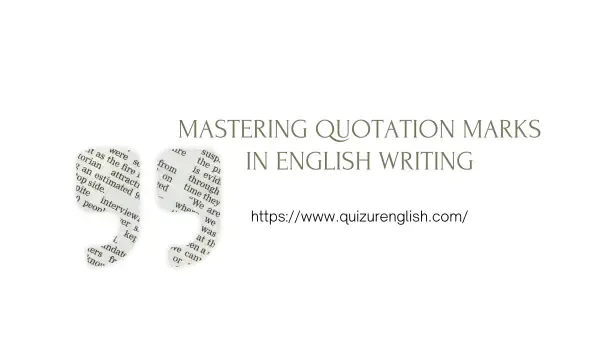Mastering Quotation Marks in English Writing
Understanding Quotation Marks
Quotation marks, also known as "quotes" or "inverted commas," play a critical role in English writing. They serve various purposes, such as highlighting speech, denoting titles, and emphasizing specific phrases. Proper use of quotation marks enhances clarity and professionalism in writing.
The Types of Quotation Marks
There are two primary types of quotation marks used in English:
- Double Quotation Marks (""): These are used to indicate direct speech, titles of certain works, or to draw attention to a particular word or phrase.
- Single Quotation Marks (''): Employed within double quotes to denote a quote within a quote or for titles within titles.
Application of Quotation Marks
Indicating Direct Speech
Direct speech is a verbatim report of words spoken by a person. Double quotation marks encase the exact words spoken.
Example:
He said, "The project is on schedule."
Highlighting Titles
Quotation marks are used for the titles of short works, such as articles, short stories, poems, and songs.
Example:
"Stairway to Heaven" remains one of the most iconic songs in rock history.
Emphasizing Terms
Occasionally, writers use quotation marks to emphasize a word or phrase, often indicating it's used in a non-standard, ironic, or sarcastic manner.
Example:
The "fresh" produce was clearly past its prime.
Quoting Text Within Quotes
When quoting text that already contains quotation marks, single quotation marks are used inside double quotes.
Example:
She said, "I read an interesting article called 'The Power of Mindfulness' yesterday."
Common Mistakes to Avoid
- Overuse for Emphasis: Using quotation marks for emphasis on common words can confuse readers and dilute the intended effect.
- Incorrect Placement with Punctuation: Punctuation marks should be placed inside the quotation marks if they are part of the quoted material.
Leveraging Quotation Marks Effectively
Mastering the use of quotation marks is essential for clear
and effective communication in English. Whether it's to denote direct speech,
highlight the titles of works, or emphasize terms, understanding their correct
application is key. By adhering to the guidelines presented, writers can
enhance their written communication, ensuring that their use of quotation marks
is both accurate and impactful.

